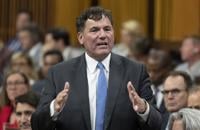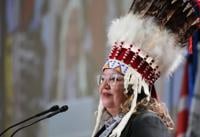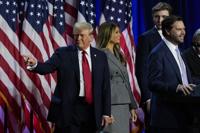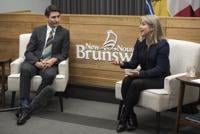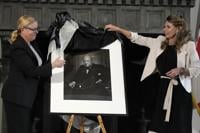REGINA - The Saskatchewan government will use the notwithstanding clause of the Constitution and pass legislation this fall to ensure the province's pronoun policy remains in place, Premier Scott Moe said Thursday.
Moe made the comment shortly after a judge granted an injunction to pause the policy that requires parental consent when children under 16 want to go by different names and pronouns at school.
Moe said in a statement he’s extremely dismayed by the injunction, calling it judicial overreach.
He said the policy has strong support from the majority of Saskatchewan residents and parents.
"The default position should never be to keep a child's information from their parents," Moe said.
He said he will recall the legislative assembly on Oct. 10 and use the notwithstanding clause, a provision that allows governments to override certain Charter rights for up to five years.
Earlier Thursday, Court of King's Bench Justice Michael Megaw ordered the injunction until a constitutional challenge can be heard in court. The challenge is set to be heard in November.
"The protection of these youth surpasses that interest expressed by the government, pending a full and complete hearing into the constitutionality of this policy," Megaw wrote in his 56-page decision.
"I find this to be one of those clear cases where injunctive relief is necessary to attempt to prevent the irreparable harm referred to pending a full hearing of this matter on its merits."
Lawyers for UR Pride sought the injunction, arguing the policy could cause teachers to out or misgender children and that it violates the Charter of Rights and Freedoms.
Saskatchewan's child advocate Lisa Broda has also said it violates rights to gender identity and expression.
Adam Goldenberg, the lead counsel for UR Pride, said in an emailed statement Moe's plans to use the notwithstanding clause "is frankly shocking."
Bennett Jensen, co-counsel for UR Pride and director of legal at Egale Canada, urged the government to conduct robust consultation. Egale is a national organization advocating for LGBTQ rights.
"Together, we can ensure that parents’ roles are fully respected without putting the most vulnerable young people in harm’s way," Jensen said.
Opposition NDP education critic Matt Love told reporters the province should not use the notwithstanding clause to implement the policy. Instead, the province should rely on the court's decision, he said.
"They're going with a sledgehammer approach to a problem," Love said.
In his decision, Megaw cited evidence from health professionals who said children experience psychological harm when their identities are invalidated.
The professionals, who submitted affidavits in support of UR Pride's application, also said parents and peers who support and recognize children's pronouns will see an improvement in the child's mental health.
"I am satisfied that those individuals affected by this policy, youth under age 16 who are unable to have their name, pronouns, gender diversity, or gender identity, observed in school will suffer irreparable harm," Megaw wrote.
The government supplied evidence from Erica Anderson, a clinical psychologist from the United States, who said youth who "socially transition" are making an important decision and that reversing it can be "psychologically hard."
Megaw noted Anderson did not provide a comment on the severe mental health and physical abuse gender-diverse youth could suffer if they don't have supportive parents.
He also said the government's argument that a six-year-old would ask to be identified by a different name, pronoun or gender "lacks persuasiveness" and is "without foundation or basis on the materials that are before the court."
The Ministry of Education took nine days in August to finalize a draft of the policy, releasing it four days later to the public and school divisions.
It also received 18 letters, submitted from June to August, from people who said they support New Brunswick's pronoun policy, which is similar to Saskatchewan's. Seven of those who wrote the letters identified as parents of schoolchildren.
Megaw said this evidence, submitted in an affidavit by Education Ministry Assistant Deputy Minister Michael Walter, lacked information.
"There is no indication in Mr. Walter's affidavit that the ministry discussed this new policy with any potential interested parties such as teachers, parents or students," he wrote.
He added there also was no indication the government sought expert or legal assistance to determine the effect of the policy and its constitutionality.
The federal justice minister said in a statement that the injunction should have given the Saskatchewan government pause.
"A judge agreed that what the government is doing may cause irreparable harm to some of its most vulnerable young people," said Arif Virani. "Just as important, they are acting before a court has had the opportunity to review their proposed policy for its constitutionality.
"Violating individual rights should not be a decision taken lightly.”
This report by şÚÁĎłÔąĎÍř was first published on Sept. 28, 2023.










